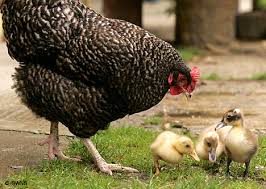 Lent 2-C Feb. 28, 2010
Lent 2-C Feb. 28, 2010 Genesis 15:1-12, 17-18
Psalm 27
Philippians 3:17-4:1
Luke 13:31-35
Cities are dangerous places. The streets are icy in winter, and in summer we trip over the cracked sidewalks. Gangs and guns are a bad combination in crowded neighborhoods.
Jerusalem in Jesus’ day was a dangerous place. The holy city – the place where heaven and earth meet – is characterized by Jesus as the place that kills prophets and all manner of people who come to help it. And yet that is just where Jesus is headed in today’s reading. The Gospel of Luke, that this passage is from, mentions the city of Jerusalem 90 times, and today’s passage is the most poignant and powerful. Here Jesus laments, cries, weeps that his beloved city is so violent and dangerous a
 nd corrupt. He describes the civic leadership as wily, predatory foxes, and he himself as the perfect prey for a fox: a mother hen, who has only beating wings and an indignant heart to protect her vulnerable chicks: no armed resistance, no claws or talons, no mighty fortress is this God.
nd corrupt. He describes the civic leadership as wily, predatory foxes, and he himself as the perfect prey for a fox: a mother hen, who has only beating wings and an indignant heart to protect her vulnerable chicks: no armed resistance, no claws or talons, no mighty fortress is this God. This winter seems a good time to read this lesson, this winter of considerable discontent. Devastating earthquakes—the one in Haiti was very close to us and many people we know, and followed yesterday by one in Chile. Even now, when we may not see daily photos of people in peril, we know that those cities are very dangerous places indeed, where people have little shelter or security. Here at home we also know people living on the streets, in all kinds of weather. As you know my own husband has had a terribly hard time recovering from surgery, and we know other friends or family ill or in difficulty. This parish struggles along, a faithful crew of us, yes, but finances are tight, cracks in the walls leak when it rains, the furnace can’t possibly fill this place with enough heat, and there are few people able to take up the burdens of leadership. Yes, indeed, the image of dear, peep-peeping vulnerable chicks fits us to a T – and who is there to lead the way? Nothing but a cluck-clucking mother hen: what good is she, to protect us from the fox around the corner?
Perhaps the thing that makes me feel most vulnerable is not knowing what the future has in store. A vain hope, isn’t it? A silly thing to wish for, or to put stock in. None of us can possibly know what will happen next. And yet, obviously, we have to base our lives on some predictability, some reasonable guess about what will happen next. That fear hit me terribly when I could not figure out why my husband kept getting sick, and it hits me terribly here, in this parish, when we have a hard time figuring out what of the many important things ahead of us we should do next. When the rain floods in by the office door. When there are near fisticuffs while people are waiting for lunch at the Table. When the heat does not work, or we don’t know how the electrical bill is going to be paid. At times like that, the reality is that we are all baby chicks, with nothing between us and that fox licking his chops except that ineffectual mother hen we keep reading about.
It’s Lent, isn’t it? When everything about church life directs to that very vulnerable and frightening day in the not too distant future when foxy Jerusalem gets the better of Jesus and leads him off to die on the cross. It’s not a future we can control, or be comfortable with or look forward to.
I am sure there were followers of Jesus who wanted him to be anything but that wimpy mother hen character. Who wanted him to fight back with weapons and swords, to change that dangerous city of Jerusalem into a shining city on a hill, safe, secure, prosperous. Don’t we all want the right things to happen? And it is profoundly disappointing when that future does not go our way. Jesus would make anybody mad – the people he confronted, and the people who followed him, both. We all want a good future, a good life, and Jesus, you promised us, and
 now all we get is this clap trap about mother hens and heading off to death.
now all we get is this clap trap about mother hens and heading off to death. Many years ago, when my grandmother lay gravely ill in the hospital, a social worker sat me down and said, “Let go, let God.” It may not have helped then, when I was frightened of the future, to hear that, but looking back on those days, it helps now. I know it helped me say good-bye to my grandmother and to grieve her and to celebrate her life in all its wonderfulness. I could not control her impending death, could not decide what path she should take or how long she would travel that way. I couldn’t do anything about it, but get in my own way of that future that I could not imagine.
That’s Lent. There are things happening around us that we do not like, and they seem to be headed in a direction we do not want them to go. Jerusalem has turned into one dangerous place. What the hell are we doing here?
It’s time to let go, and to let God.


.jpg)
.jpg)







.jpg)
